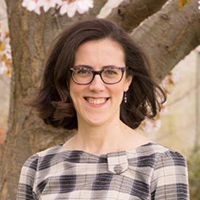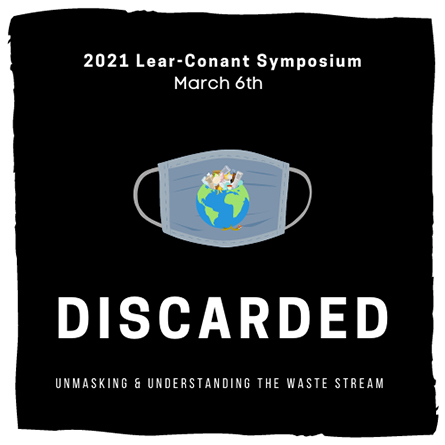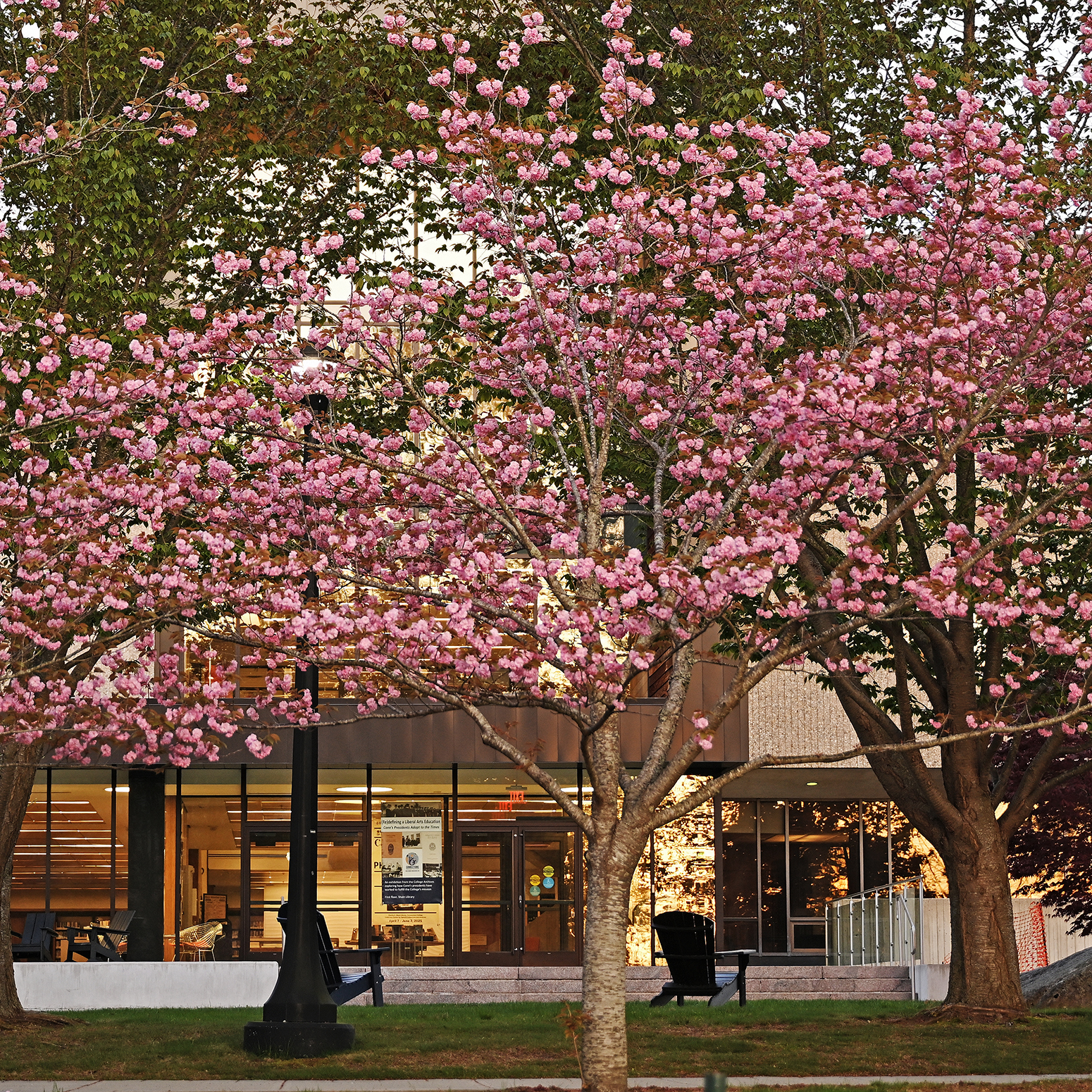
DISCARDED: Lear-Conant Symposium explores impact of human-generated waste
Garbage, trash, discards, waste—humans create it with nearly everything we do, and it impacts our ecosystems and our communities in diverse and often unanticipated ways.
The long-term implications of our severance of relationships with possessions was the topic of discussion for hundreds of experts, faculty, students, alumni and community members from around the world who gathered virtually March 6 for the Goodwin-Niering Center for the Environment’s 2021 Lear-Conant Symposium, “DISCARDED: Unmasking and Understanding the Waste Stream.”
“We always try to make these conferences interdisciplinary, and I hope that participants came away with a sense of the variety of different approaches that one can take to ‘unmasking and understanding the waste stream,’” said Professor Derek Turner, the Karla Heurich Harrison ’28 Director of the Goodwin-Niering Center, citing presentation topics that ranged from applying concepts from ecology to further understand industrial processes and create industrial systems that mimic natural ecosystems, to the power relations of practices of discard, to the use of recycled materials in the arts.
The day-long symposium featured experts including Robin Nagle, a clinical professor of anthropology and environmental studies in New York University’s School of Liberal Studies and author of Picking Up, an ethnography of New York City’s Department of Sanitation; Max Liboiron, associate professor of geography at Memorial University of Newfoundland and director of the Civic Laboratory for Environmental Action Research (CLEAR), which develops feminist and anti-colonial methodologies in the natural sciences; Marian Chertow, associate professor of industrial environmental management and director of the Program on Solid Waste Policy, and of the Industrial Environmental Management Program at Yale School of the Environment; Samantha MacBride, adjunct assistant professor, Marxe School of International and Public Affairs, Baruch College, CUNY; and Billy Dufala, a Philadelphia-based artist and co-founder of the Recycled Artist in Residency program, which aims to create awareness about sustainability by creatively repurposing the waste stream.
“We have been reading and writing essays about the works of the speakers. I was excited to attend [the symposium] and learn more,” said Goodwin-Niering Center scholar Caty Fortin ’21. “I introduced Dr. Marian Chertow, who discussed her research and work on Industrial Symbiosis. I was excited to introduce her because her research and work has been on the global scale and I've learned so much from all of it.
“I think Max Liboiron’s talk on waste colonialism and its connections to other systems of power and how it is perpetuated in environmentalism was a very important and necessary conversation to have at this conference,” she added.
The Goodwin-Niering Center for the Environment (GNCE) sponsors biennial conferences focusing on various environmental topics. The conferences are open to the College community and to the public at large, drawing participants and experts from institutions and organizations around the world.
This year’s Lear-Conant Symposium honored the memory of two Conn alumnae, Elizabeth Babbott “Babs” Conant ’51 and Helen Fricke Mathieson ’52, both of whom passed away since the last symposium in 2019.
“These two amazing women will forever be connected to Connecticut College and the Goodwin-Niering Center,” Turner said. “They were both committed environmental activists, and they both played formative roles in the Goodwin-Niering Center’s history.”
Turner shared remarks and memories from several former directors of the center, who recalled the critical financial support Mathieson provided to help establish the center, as well as her interest in Conn’s broader environmental curriculum and commitment to attending center events. He also shared written remarks from historian, author and emeritus trustee Linda Lear ’62, who established the Lear-Conant Symposium with a gift to the College in 2002 in honor of Conant, a biologist, activist and Lear’s former dean and lifelong friend.
“She was an activist for world peace, for women’s rights, for human rights,” Lear wrote of Conant. “I wanted to honor her brilliance as a zoologist, teacher and role model by supporting these lectures. It’s my great joy to have the Goodwin-Niering Center carry on her academic passions.”
In her remarks during the symposium’s opening event, President Katherine Bergeron shared her own memories of both Conant and Mathieson and said the College was honored to be joined by several family members and friends of both women.
“I cannot imagine a better way to celebrate two brilliant Connecticut College alumnae, Helen Mathieson and Babs Conant, than on a brilliantly sunny Saturday morning in a room full of people at a symposium on an urgent topic hosted by both the center for the environment and the College they loved and supported for so many years,” Bergeron said.
GNCE scholars Ella Rumpf ’21 and Morgan Maccione ’21 both served on the planning committee for the symposium and were excited to see it come to fruition.
“I was very excited to get involved in the planning process because I have such an interest in waste issues,” Rumpf said. “I've been working this semester on my senior integrative project on the philosophy and ethics of the zero-waste movement, and getting to hear from speakers whose work I have read, as well as others, is super enlightening and helpful for informing my research.”
Maccione added that her senior integrative project also has to do with discard studies, so she found the symposium particularly fascinating.
“My favorite presentation (though they were all amazing) was Dr. Nagle’s. I loved looking at the objects that were discarded (in the case of the Molina Collection) and left behind (in the case of Dead Horse Bay). I was left feeling curious about the people to whom these items belonged and why those items were thrown away or left behind,” she said.
Milo Becker ’22, Conn's Student Government Association chair of sustainability and a GNCE scholar, said the symposium was an excellent opportunity to further develop his understanding of waste systems and cultures.
“At one point, Robin Nagle said that only about 7% of our trash is a product of individuals and households, and the rest comes from commercial activities,” he said. “I think that it’s important to be aware of our own consumption, but it is not necessarily fruitful to be completely fixated with it. Like many other environmental issues, our issues with discard are systemic.”
Tess Beardell ’21 added that the symposium built on the topics GNCE scholars have been studying in their seminars, including waste management, distributive equity and over-consumption.
“My biggest takeaway from the event is that in order to address national and international injustices created by waste processing, priority must be given to creating responsive solutions that prioritize the needs of people who are made to live in and around waste,” she said.
The GNCE’s 2021 Lear-Conant Symposium was co-sponsored by the Beaver Brook Endowed Fund, the Jean Thomas Lambert Endowed Lecture Fund, the Connecticut College Office of Sustainability, the Ammerman Center for Arts and Technology and the Anthropology Department.
Turner said he was particularly grateful to the GNCE staff for their work putting the Symposium together.
“Keleigh Baretincic, our program coordinator, went above and beyond to ensure that this symposium—our first one ever using Zoom webinar—went off without a hitch. Associate Director Jennifer Pagach-Lamb was also involved in every aspect of the planning. And Professor Anthony Graesch, our senior faculty fellow and an archaeologist with an interest in discard studies, did so much to help assemble such a great group of speakers,” he said.
Videos of the symposium’s lectures will be available on The Goodwin-Niering Center for the Environment’s YouTube channel soon.

